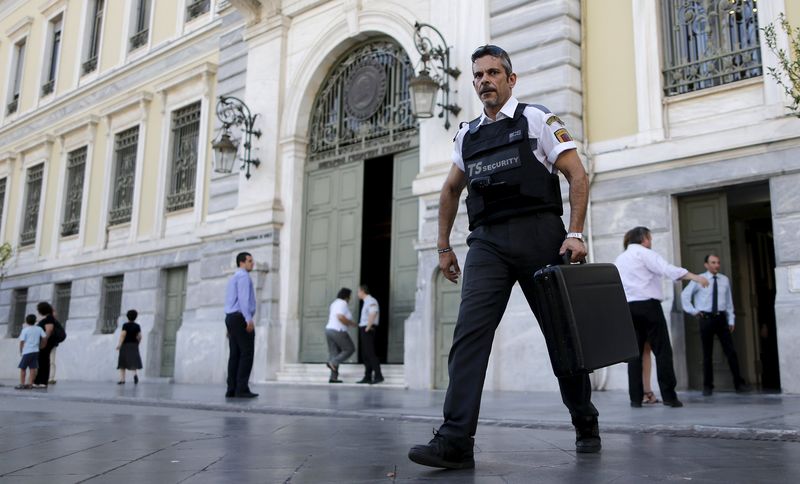By George Georgiopoulos and Stephen Grey
ATHENS (Reuters) - Greece's banks will need an estimated 10 to 14 billion euros (7.2 to 10.08 billion pounds) of fresh capital to keep them afloat and more time before they reopen even if a deal is reached with European creditors on Sunday, a senior Greek banker told Reuters on Friday.
Shut for two weeks, banks have relied on an ECB-approved emergency credit line from the domestic central bank to dispense rationed cash and are due to reopen on Tuesday, barring another extension of the bank holiday.
Despite their having bled more than 34 billion euros of deposits since December and Greece's worsening economic outlook, banks are optimistic that branches can be reopened by the end of next week, the banker said.
"Liquidity is assured at the daily 60 euro withdrawal limit until Monday night," the banker said, declining to be identified. "There is a cushion of about 750 million euros until then."
National Bank (AT:NBGr), Piraeus (AT:BOPr), Eurobank (AT:EURBr) and Alpha (AT:ACBr), which account for about 95 percent of the industry, will likely need to be recapitalised after an assessment by regulators and are not likely to return to a semblance of normalcy for months.
"There is an estimated need of about 10 to 14 billion euros in new capital," the banker said. "Given the magnitude of the shock we have been through, regulators will take stock of the situation and the impact on non-performing loans. A stress test by September would allow time for things to normalise."
Athens would seek to raise the money from private investors, but if it proves futile, banks may get a capital injection from the European Support Mechanism's Direct Recapitalisation Instrument (DRI), a new facility which has so far been unused.
It is unclear yet what conditions would be imposed by the ESM in return for such capital, although it is expected to involve a commitment to major restructuring of the Greek financial sector.
The European Stability Mechanism declined to comment on options in Greece but has made clear the rules for its new re-capitalisation instrument are stringent and capital from European taxpayers will only be injected after a "bail-in" of the bank's own resources, as well as a contribution from a national resolution fund.
A bail-in could involve cash calls from bank shareholders, haircuts to bondholders, or potentially haircuts to some depositors, as in the case of Cyprus two years ago, although the Greek government says it opposes this.
Banks expect that a deal on Sunday will prompt the ECB to pump liquidity into the system and raise the cap of emergency liquidity assistance (ELA) from a current 89 billion euros, allowing banks to draw funding from the Bank of Greece.
Without an agreement with creditors on Sunday, the ECB would keep the liquidity taps closed and banks would face insolvency and nationalisation if the country leaves the euro.
"The liquidity problem will be solved, the challenge will be the recapitalisation, the speed at which capital can be replenished," the banker said.
Banks have been struggling to keep their automated teller machine (ATM) networks fed with banknotes and dispense cash at the daily withdrawal limit, gradually using up the remaining cash buffer in the system.
"The ATM outflows have averaged about 80-100 million euros a day but there have been inflows from tourists, supermarkets and exporters," the banker said, adding the Greek central bank had renewed its request for 6 billion euros in emergency funding from the ECB.
On top of the cash paid out in ATMs every day in Greece there is also 50 million euros in authorised transfers abroad daily for essential imports, despite capital controls.
The banker projected a much faster pace of normalisation for the sector than was the case in Cyprus, where capital controls lasted for two years, although there are doubts whether Greece's banking system can emerge from the financial shock without an overhaul.
"This is not Cyprus. Once an agreement is reached with creditors and financing for the next three years, the situation will normalise faster than in Cyprus," the banker said, adding that controls could start to be lifted "as early as within a fortnight."
"Once banks are perceived to be solvent, this will influence the speed of their return to normality and capital controls can be lifted faster as deposits come back."
While European officials predict major consolidation in the sector, which may see some Greek banks taken over by stronger rivals as part of a restructuring that would follow a bailout of the country, the banker said mergers of the big four would be opposed in Athens.

Provided the banks were solvent, "it is important to have competition in the system."